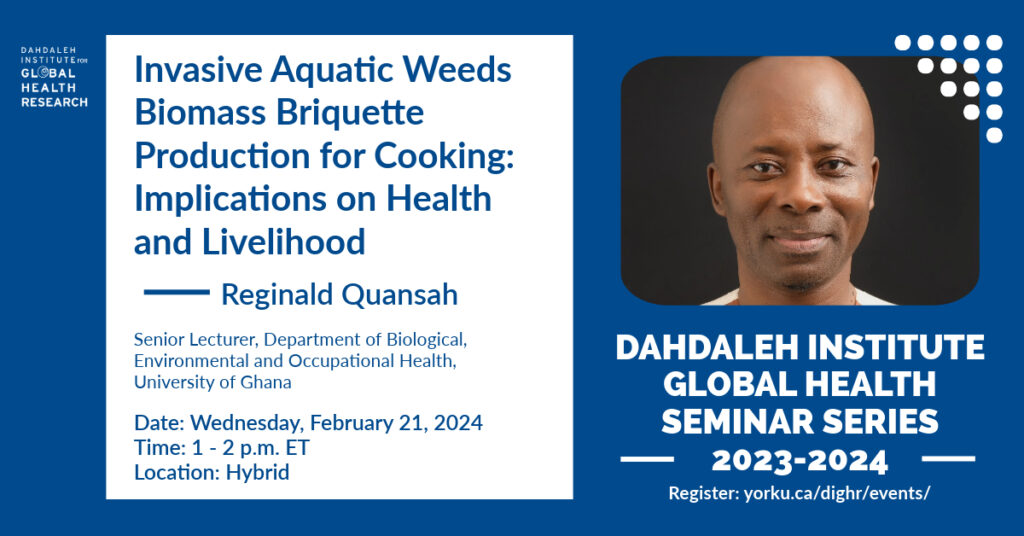Invasive Aquatic Weeds Biomass Briquette Production for Cooking: Implications on Health and Livelihood, with Reginald Quansah
Dr. Reginald Quansah's research group conducts work on producing biomass briquettes from invasive aquatic weeds for use as cooking fuel. In this seminar, he will discuss health and livelihood implications as well as his preliminary findings from this project.
Invasive aquatic weeds (IQW), particularly water hyacinth, are a significant problem in Ghana, causing water quality issues and disrupting ecosystems by affecting fish health, abundance, and aquatic biodiversity, as well as the phytoplankton population (Kusemiju, 2002). They release methane into the environment through a process called methanogenesis. The growth of weeds also causes algal blooms, causing fish mortality. The dense and massive growth of weeds is responsible for floods and diseases such as malaria, typhoid, and schistosomiasis in riparian communities. Fishermen, and particularly women fish traders, have experienced a significant reduction in their trade.
Riparian populations have turned to manual removal of weeds, which has grown to be a significant source of greenhouse gas emissions. Aquatic weeds, especially water hyacinth, have a number of beneficial uses. These include the production of biogas, paper, organic fertilizers, fiber, human food, and animal feed, as well as the treatment of wastewater (e.g., Sawyerr et al., 2019; Sürmen & Kara, 2021). With the advancement of technology, biomass briquettes for commercial, industrial, and residential usage have been produced from a variety of biomass materials, including agricultural leftovers, sawdust, wood, coconut husk, industrial and municipal waste, and wheat straw. Aquatic weeds have a high energy efficiency because of their high proteins and fat composition. The vast availability and fast rate of reproduction of aquatic weeds make them a great substitute for conventional fossil fuels.
High-quality biomass fuel briquettes made from invasive aquatic weeds can offer a low-cost alternative domestic fuel and help low-income riparian families prepare safe and nutritious meals. Converting invasive aquatic weeds into briquettes would also offer employment opportunities and income to youth and women. Register for this seminar to learn more about this valuable opportunity to address the menace of invasive aquatic weeds and domestic dirty fuel challenges in poor resource settings in LMICs.

Speaker Profile
Reginald Quansah is an environmental epidemiologist. He received his M.Sc. and Ph.D. education from the Lulea University of Technology and the University of Birmingham, respectively, and postdoctoral training at the Centre for Environment and Respiratory Health Research (CERH), Oulu University of Technology (Finland). His research generally focuses on children and women's environmental health, assessing exposures in vulnerable populations like mothers, children, low-income communities, and occupational workers. Specifically, he is interested in assessing the impact of environmental exposures in homes and at schools and the health impacts of pesticides, air pollution, and climate change on vulnerable populations. He also seeks to take his research a step further by designing and implementing interventions that mitigates environmental exposures, particularly household air pollution, and minimizes the risk of potential adverse health outcomes.
Reginald worked closely with the WHO in the development of a training manual on air pollution and health for clinicians and as a resource person for WHO training on building health workforce capacity on air pollution and health (both online and in person in Ghana). He served as a member of the WHO External Review Group (ERG) for the update of the WHO Global Air Quality Guidelines. He led the development of a curriculum for a M.Sc. program in Environment and Public Health at Kwame Nkrumah University of Science and Technology—African Institute of Sanitation and Waste Management (K-AISWAM).
He has participated in several national and international forum talks on climate change and clean cooking technology. He is a member of Ghana's National Technical Committee for Environmental Management. He serves on the editorial boards of Frontiers in Environmental Health and PLoS Global Public Health.
Before joining the School of Public Health, Reginald was leading systematic review and meta-analysis projects at CERH. He has led several international systematic reviews and meta-analyses projects, published in high-impact factor journals. Reginald was part of a team that conducted systematic reviews and meta-analyses to support the WHO's new recommendation for the management and eradication of human schistosomiasis.
Register below and join us on Wednesday, February 21, at 1 p.m.
RSVP
Registrations for this event has closed.

